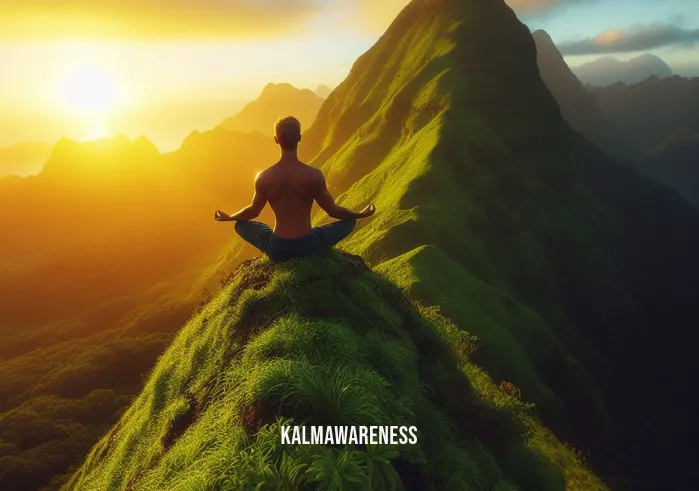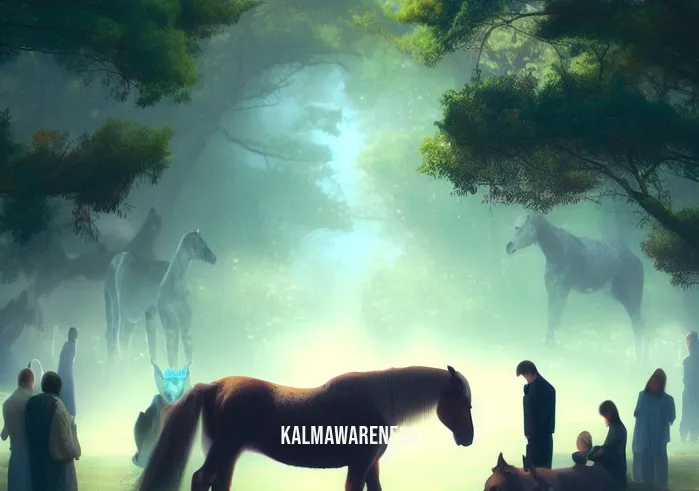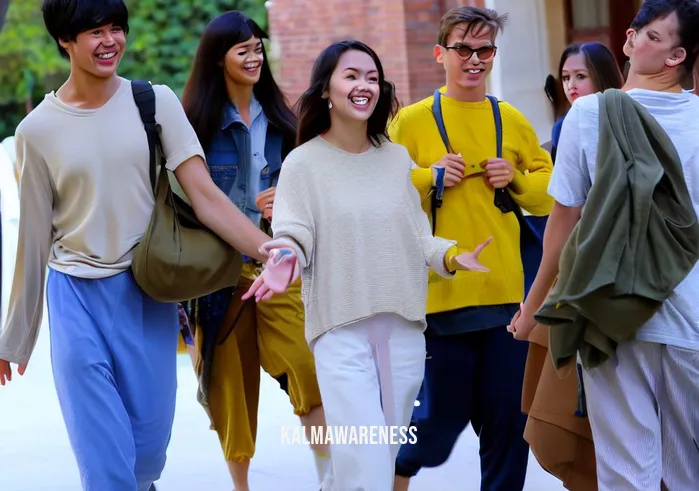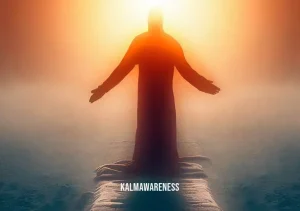Meditating While Drunk: A Dive into Mindfulness and Self-care
Meditation, in all its myriad forms, has long been celebrated for its power to center the mind, offer solace, and reconnect the self with the inner universe. It’s not just an ancient spiritual practice, but a scientifically proven method to enhance mental health and provide relief from daily stressors. Yet, as diverse and adaptive as these techniques are, few have dared to venture into the lesser-explored territory of meditating while drunk. What does mindfulness look like in an inebriated state? Does alcohol enhance the meditation experience or detract from its essence?
The Foundation of Mindfulness
Before diving deep into the unconventional coupling of meditation and alcohol, it’s crucial to understand the bedrock of mindfulness itself. At its core, mindfulness is the practice of being in the present moment. This may sound simple, but consider how often our minds wander – reminiscing about the past, fretting over the future, or getting caught up in habitual thinking patterns. By honing our focus on the now, we cultivate a space for clarity, heightened awareness, and inner peace.
The world is rich with meditation techniques. Some have roots in ancient African practices, while others, like micromeditating, are contemporary adaptations designed to fit the fast-paced world. Each technique has its merit, but the shared objective remains consistent: alignment with the present.
The Dance of Alcohol and Awareness
Introducing alcohol into the equation might seem counterintuitive. After all, alcohol is known for clouding judgment, slowing reflexes, and, in some instances, dulling awareness. Yet, when approached with a sense of curiosity and intent, can alcohol’s relaxing properties complement meditation’s tranquil essence?
Imagine a glass of wine after a long day, the warmth that spreads through your limbs, the weight that lifts off your shoulders. Alcohol, for many, is a form of relaxation. It’s a momentary escape, a breathing space from the hustle of daily life. There’s no denying the appeal. But can this relaxed state enhance our mindfulness muscle, similar to how athletes use mindful martial arts to improve focus and discipline?
The Risks and Rewards
There’s a delicate balance to maintain. Like any other substance, moderation is key. Overindulgence can swiftly tip the scale from a mindful, relaxed state to a blurred, disjointed experience. But, when managed, the relaxed inhibitions that alcohol brings might just pave the way for deeper introspection. One could argue that the walls we build, the barriers that often prevent us from achieving true mindfulness, might be momentarily softened, allowing for a genuine mindful miracle.
However, the potential risks shouldn’t be downplayed. Alcohol, for all its social acceptability, can be addictive and harmful. Combining it with meditation, a practice fundamentally about self-awareness and health, requires a robust understanding of one’s limits.
Meditation Beyond the Conventional
While meditating while drunk is an area still brimming with questions, it’s evident that the world of mindfulness is vast and multifaceted. From meditation in motion that integrates physical activity, to specialized sessions like meditation for menopause, the realm of self-awareness is ripe with exploration. And as science continues to uncover the myriad benefits of these practices, the line between convention and innovation will likely blur, making room for newer, perhaps even more surprising, methodologies.
Conclusion: A Journey Worth Exploring?
As we embark on this journey, understanding the profound depth of meditating while drunk, we’ll delve into science, philosophy, personal anecdotes, and expert opinions. We’ll explore the myriad ways in which alcohol intersects with mindfulness, relaxation, and self-care, and whether this unconventional practice has a place in our daily lives.
If you’re curious about the potential synergy between alcohol and meditation or are simply seeking novel approaches to mindfulness, you’re in the right place. As we proceed, we will further unwrap this enigma, ensuring a holistic view of its implications and potential.
Stay tuned and continue reading to embark on this unparalleled exploration in the next segment.

The Intertwining Path: Alcohol and Mindfulness
Alcohol, a substance with deep historical roots and countless cultural implications, has often been associated with relaxation and escape. Mindfulness, on the other hand, is about embracing reality and staying grounded. At first glance, they seem like opposites. Yet, when combined, they lead to the curious concept of meditating while drunk. But is this practice mere folly or a genuine path to deeper self-awareness?
Unraveling the Threads: The Anatomy of Inebriation
First, it’s essential to understand the different stages of inebriation. As we imbibe, our bodies go through a sequence of physiological and psychological changes. Here’s a breakdown:
Euphoria: Often the initial stage after consuming alcohol. The individual feels relaxed, more sociable, and may experience slight impairments in reasoning and memory.
Excitement: As the alcohol content increases, symptoms might include impaired sensory perceptions, reduced pain sensation, and potential mood swings.
Confusion: Here, one might face severe motor impairments, a staggering gait, blurred vision, and confusion.
Stupor, Coma, Death: These are extreme stages, resulting from very high alcohol intake.
Now, one could argue that the initial stages, particularly euphoria, might complement meditation. The reduced inhibitions and heightened sociability could potentially pave the way for introspection. However, as we delve deeper into the stages, it’s evident that the higher stages are not conducive to mindfulness.
Balancing the Scales: Potential Benefits and Drawbacks
Meditating while drunk isn’t a one-size-fits-all proposition. Here’s a table summarizing the potential benefits and drawbacks, dependent on various factors:
| Factors | Potential Benefits | Potential Drawbacks |
|---|---|---|
| Level of Inebriation | Light inebriation might aid relaxation. | Heavy drinking impairs cognitive functions. |
| Individual Tolerance | Some might achieve deep introspection. | Some might feel too distracted. |
| Setting | A calm setting can enhance experience. | A noisy, chaotic environment hinders focus. |
| Meditation Experience | Experienced meditators might navigate better. | Novices might find it challenging. |
| Intent | Purposeful approach might yield insights. | Casual or unintentional might not benefit. |
Stories and Anecdotes: From the Meditation Floor
While meditating under the influence might sound novel, many have dipped their toes into this merging stream. For example, meditation stories for students often highlight the myriad ways young adults experiment with mindfulness. Alcohol, being a prominent feature of college life, naturally intertwines.
Another fascinating read is the array of mindfulness books for teens, shedding light on how the younger generation navigates this space. The growing awareness, especially in a world riddled with distractions, is a testament to mindfulness’s enduring appeal.
The Verdict: To Imbibe or Not?
There’s no straightforward answer. For some, a light drink might indeed act as a catalyst, breaking down barriers and opening doors to profound introspection. For others, especially those new to meditation, the combination might lead to a muddled experience. The key lies in understanding oneself, knowing limits, and setting intentions.
Know Your Limits: Recognize how alcohol affects you. Remember, the goal isn’t to be inebriated but to find a balance.
Set Your Intentions: Why are you meditating while drunk? If the purpose is clear, the path becomes more transparent.
Seek Guidance: Sites like a renewed mind employee portal offer insights and guidance on balancing mental health and substances.
Setting the Course for Chapter 3
We’ve now delved into the mechanics of meditating while drunk, understanding its nuances and implications. Yet, the journey is far from over. In the next segment, we’ll dive into personal stories, expert insights, and delve deeper into the ethical dimensions of this practice. Can meditating under the influence be ethically justified? How do different cultures perceive this merging of worlds?
The path is winding, but with each step, the horizon becomes clearer. Continue reading, and together, we’ll explore these intersections in greater depth.

Intoxicated Illuminations: Finding Hope in the Haze
In the realm of meditative practices, few topics are as controversial or intriguing as the merger of mindfulness and alcohol. While our previous chapters focused on the science and potential applications of meditating while drunk, this segment dives into the heart of human experience. How have individuals found hope, solace, and inspiration while meditating under the influence? What tales of transformation emerge from the unlikely blend of inebriation and introspection?
“The Fog Lifted, and Clarity Emerged”
This sentiment, echoing through countless mindful en español testimonials, encapsulates the potential transformative power of meditation, even in altered states. The idea is that sometimes, amidst the mental fog of inebriation, unexpected epiphanies might occur.
“In the haze of wine, I discovered a truth about myself, a truth that might’ve remained hidden in sobriety.” – Anonymous Meditator
The Story of Maria: From Despair to Discovery
Maria, a middle-aged woman from the bustling city of Madrid, found herself at life’s crossroads. With mounting pressures and a crumbling personal life, she sought solace in both wine and meditation. Initially, these were separate refuges. But one fateful evening, the worlds merged.
After a particularly tough day, Maria sat down with a bottle of her favorite red wine. As the evening progressed, she decided to meditate, something she’d been practicing for years. The result was unexpected. The barriers she’d erected, fueled by societal expectations and personal fears, seemed more permeable.
“There, in the stillness of my inebriated mind, I touched a part of my soul I never knew existed. It was raw, it was real, and it demanded to be heard.” – Maria
Her experience, while unique, isn’t isolated. Many individuals, through various mindful hiking journeys or even sessions with a meditation consultant, have reported similar epiphanies. The intersection of alcohol’s inhibitory relaxation and meditation’s introspective power can sometimes result in profound self-awareness.
Navigating the Inner Terrain: Potential Pitfalls and Pearls
However, it’s crucial to approach such experiences with caution and awareness. Not everyone will find answers at the bottom of a glass. Yet, for some, as showcased in gratitude yoga sessions in Princeton, the combination can lead to a deeper appreciation of life’s intricacies.
“Alcohol took away my fears, meditation showed me my dreams. Together, they painted a picture of who I could become.” – Jake, a regular practitioner
The Essence of Exploration: Embracing Uncharted Realms
In the pursuit of self-awareness, there’s no singular path. The fusion of meditation and alcohol, while untraditional, offers a testimony to humanity’s endless quest for understanding. It speaks to our innate curiosity, our willingness to challenge conventions, and our undying hope to discover pockets of illumination, even in the unlikeliest of places.
Venturing Forth: What Lies Ahead
Having navigated the emotional and experiential tapestry of meditating while drunk, our next chapter promises a deep dive into the ethical realm. How do experts view this practice? Is there a moral dimension to consider?
Continue reading as we unravel these questions, offering a holistic perspective on this intriguing intersection of mindfulness and inebriation.
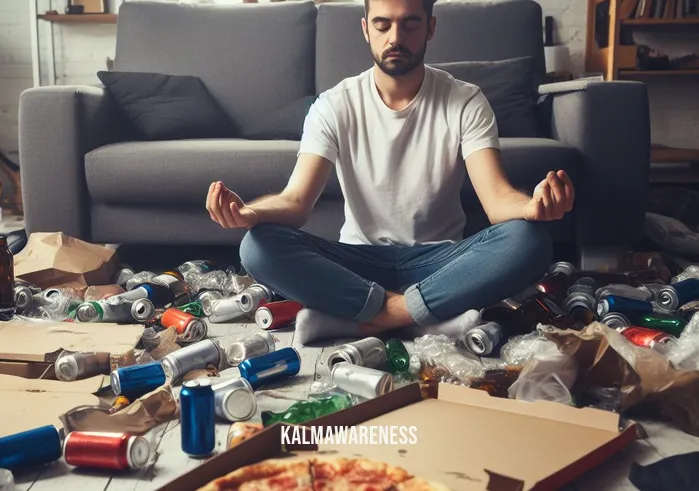
Unveiling the Layers: Understanding Meditating While Drunk
The enthralling journey of melding mindfulness with mild intoxication has unveiled myriad perspectives, stories, and revelations. Yet, to truly grasp the essence of meditating while drunk, we need to deconstruct its components meticulously. By dissecting the process, potential benefits, and challenges, we can gain a comprehensive understanding of this unconventional practice.
Key Components of Meditating While Drunk
Understanding the intricate dance of meditation and alcohol requires a deep dive into their individual and combined elements:
Alcohol’s Influence:
- Euphoria: The initial burst of relaxation and sociability.
- Diminished Inhibitions: Making individuals more open and less guarded.
- Potential Cognitive Impairment: Can hinder deep focus and awareness at higher consumption levels.
Meditation’s Core:
- Focused Awareness: Concentration on the present moment.
- Deep Breathing: A core aspect highlighted in Breathing and Meditation.
- Introspection: Deep self-analysis and reflection.
- Centering of Emotions: Stabilizing emotional turbulence.
When Combined:
- Enhanced Relaxation: Alcohol might facilitate quicker relaxation before meditation.
- Varied Depth: Depending on the level of inebriation, meditation might either be profound or superficial.
- Emotional Amplification: Alcohol might amplify suppressed emotions, which can surface during meditation.
Potential Benefits of the Fusion
Delving into the benefits, it’s clear that when executed mindfully, this practice might offer:
- Barrier Breakdown: Alcohol can potentially lower mental barriers, enabling deeper introspection.
- Novel Perspectives: The altered state might offer a fresh perspective on old problems or traumas.
- Enhanced Creativity: As supported by mindful martial arts, merging unconventional components can spark creativity.
Challenges to Navigate
Yet, it’s not a practice devoid of pitfalls. Some challenges include:
- Dependence Risk: Over-reliance on alcohol for meditation can lead to addiction.
- Distorted Reality: Alcohol might distort the true essence of meditation experiences.
- Physical Health Concerns: Excessive alcohol consumption is detrimental to health, which contrasts the health benefits of meditation.
Ethical Considerations
While this chapter doesn’t focus on ethics, it’s worth noting a few points:
- Intention Matters: If the intent is escapism rather than genuine self-exploration, the practice might be ethically questionable.
- Respect for Tradition: Traditional meditation purists might find the inclusion of alcohol disrespectful.
- Health Over Hedonism: It’s crucial to prioritize mental and physical well-being over momentary pleasures.
Gearing Up for the Grand Finale
As we’ve deconstructed the practice of meditating while drunk, we’ve unearthed its multifaceted nature. Yet, every journey requires reflection, consolidation, and a concluding thought. In our concluding chapter, we’ll tie together the threads of understanding, delving into final reflections and providing actionable insights for those curious to explore this path.
Continue reading to experience the culmination of this profound exploration in the next chapter.
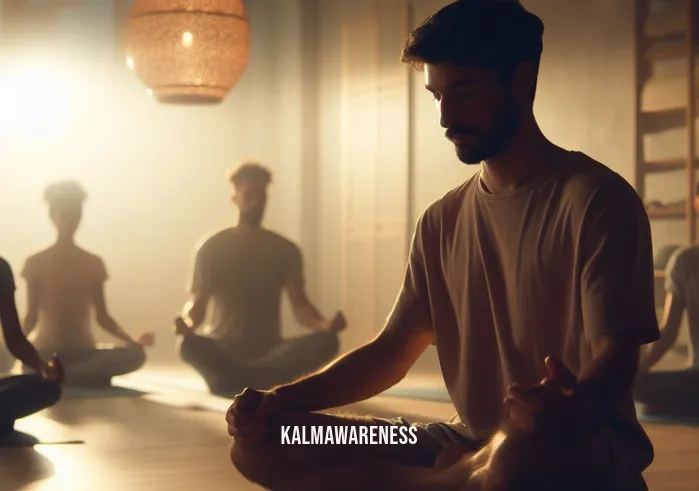
Elixir of Introspection: Reflecting on Meditating While Drunk
Our voyage through the tapestry of meditation interlaced with alcohol’s embrace has been nothing short of enlightening. From understanding the foundations to unraveling personal tales of discovery and even ethical ponderings, we’ve embarked on a journey that blends ancient mindfulness practices with the contemporary influence of alcohol. As our exploration draws to a close, let’s take a moment to savor the insights gleaned and chart the course for future endeavors.
A Journey Recapped: The Highs and Lows
We commenced with curiosity, seeking to understand how alcohol, often seen as a veil over reality, could merge with meditation’s pursuit of truth. Along the way, we:
- Unearthed the science behind the combined effects of alcohol and mindfulness.
- Discovered the potential of alcohol to lower barriers and amplify suppressed emotions.
- Recognized the inherent risks, emphasizing the importance of intent and moderation.
- Delved into real-life stories, drawing inspiration and cautionary tales from those who’ve ventured down this path.
- Highlighted the ethical dimensions, urging respect for tradition and health.
Applying Our Learnings: Where to Go from Here
Understanding the nuances of meditating while drunk is only the first step. Applying these insights in real-world scenarios demands care. For those intrigued:
- Begin with self-awareness. Recognize your reasons for merging alcohol and meditation.
- Always prioritize safety. Know your limits and never compromise your well-being.
- Seek guidance. Platforms like love yourself heart emphasize self-care, which is paramount in such explorations.
- Remember, meditation is about connection, not escape. Let alcohol be a complement, not a crutch.
A Heartfelt Thank You
To our dedicated readers, your curiosity and openness to explore this unconventional territory deserve applause. We hope this series has not only informed but also inspired, sparking thoughtful reflections and responsible experiments.
As we conclude this chapter, the pages of Kalm Awareness remain open, always ready to embark on new quests of self-discovery and enlightenment. Whether you’re interested in ancient African meditation techniques or looking for insights into mindful muscle, our platform promises a treasure trove of knowledge.
Your Next Step: Dive Deeper
Hungry for more? Our reservoir of content awaits. Revisit previous segments for enhanced clarity, or plunge into new realms of mindfulness. And while you’re at it, why not share your personal experiences or insights on meditating while drunk? Engage with our community, and let’s foster a space of shared learning and growth.
Until our paths cross again, keep exploring, stay curious, and embrace the journey of self-awareness. Cheers to many more enlightening adventures ahead! 🍷✨
